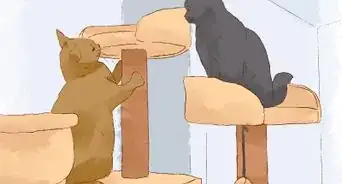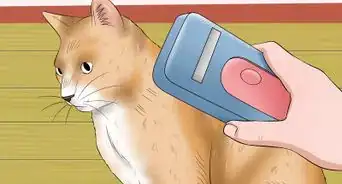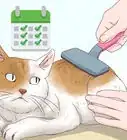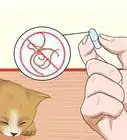This article was co-authored by Pippa Elliott, MRCVS. Dr. Elliott, BVMS, MRCVS is a veterinarian with over 30 years of experience in veterinary surgery and companion animal practice. She graduated from the University of Glasgow in 1987 with a degree in veterinary medicine and surgery. She has worked at the same animal clinic in her hometown for over 20 years.
There are 8 references cited in this article, which can be found at the bottom of the page.
This article has been viewed 21,498 times.
Neighborhood cats can be a nuisance, particularly if they are causing behavioral problems in your indoor cat. To help alleviate the problem, start by finding ways to calm your cat, through physical and medical means. In addition, you can take steps to keep the cat out of your yard, such as by removing enticements (bird feeders) and putting up deterrents.
Steps
Calming Your Cat
-
1Look for signs your cat is upset. It should be fairly obvious if your cat is upset. It may hiss or yowl. It might also puff up its fur, a tactic designed to make it look bigger and more menacing to other animals. It may also become more aggressive, attacking you or other family members (human or animal) because it can't take out its aggression on the outdoor cat.[1]
- Keep in mind that as a way to mark her territory and feel more secure, a cat is likely to urinate outside the box or spray and scratch door posts.
-
2Block out the view. While your cat may enjoy watching the birds, you may need to block its view of the outside for a while. Though your cat will likely still be able to smell the other cat, not being able to see it may keep your cat from getting as crazy, calming it down.[2]
- You may need to do more than close the blinds since cats are persistent creatures. For instance, purchase dark window clings to cover the window. Use them on the part of the window at your cat's level, and leave the top of the window open for a view.
Advertisement -
3Provide sanctuaries for your cat. It is important to provide safe spaces for your cat as well. You can do this by providing your cat with spots that are high up and some dark secure hiding holes.
- Try providing your cat with some high shelves that she can easily get up on or a tall cat tree. She may feel safer up on these high spots because she will be up off the ground and better able to see an intruder coming.
- You should also provide some hiding spots in each room, such as cardboard boxes with cat sized holes cut into them. Having a safe place that she can retreat to will also increase your cat’s sense of security.
-
4Distract your cat with puzzle toys. Cats need entertainment, just like you do. That's one reason your cat is looking outside: it wants to see what's going on. However, you can help keep your cat's focus indoors by providing more interesting toys. Often, simple toys will suffice, such as boxes and paper bags.[3] However, sometimes upgrading toys can interest your cat. For instance, puzzle toys that release treats as your cat plays with them are a great way to keep your cat entertained.
-
5Block off that area of the house. If the outdoor cat is mainly in one area (the front or the back of the house), considering keeping your cat out of that area for a while. Keep the door closed so your kitty can't venture in there and be annoyed by the outdoor cat.[4]
-
6Prevent the outdoor cat from entering your home. If you have a pet door for your cat or for other pets to use, then it is important to prevent the outdoor cat from coming into your house through it. Make sure the door is microchip activated so that only your pets can come into your home through that opening. Also, keep your cat’s food and water bowls away from the cat flap to avoid enticing the outdoor cat into your home. Move the bowls to a room that is deep into your house.
-
7Pet and soothe your cat. One way to try to calm your cat is to spend some time petting it. Gently stroke the cat in its favorite places, talking soothingly to it as you do. Use long strokes, going from the head to rump. For some cats, that may be all you need to calm them down.
- Obviously, if your cat tries to attack you, back away, and let it have some space.
Seeking Medical Solutions
-
1Try a pheromone spray or diffuser. You may notice that your cat rubs its face on items in your house, especially new items. The cat is leaving a scent behind when it does that. Basically, the cat is saying, "I've looked at this item, and it seems safe." When another cat approaches the item, that cat sees it as "safe." Pheromone sprays and diffusers play on this sense of safety by recreating that smell, giving your cat a sense of safety.[5]
- Try using a diffuser in the room where your cat most often sees the outdoor cat. The scent should help keep your cat calm. You can find these diffusers at pet stores or online.
-
2Ask about an anti-anxiety medication. In some cases, an anti-anxiety medication may be appropriate if your cat is getting very upset and aggressive. The best way to proceed is to talk to your vet and see if they think a medication is appropriate for your cat. Keep in mind that this type of medication is usually seen as a temporary solution.[6]
-
3Talk to a veterinary behaviorist. If your cat is still having problems, a behaviorist may be able to teach your cat coping techniques. For instance, the behaviorist may try to help your cat stay calm when it sees another cat. They may also try to calm down other aggressive behaviors, particularly those directed towards family members (both human and non-human).[7]
- Ask your vet for a recommendation for a behaviorist.
Deterring the Outdoor Cat
-
1Remove bird feeders and other attractions. Bird feeders obviously bring birds to your yard. In turn, neighborhood cats will show up for the free entertainment and food.[8] If you want to discourage the neighborhood cats from coming around, it's a good idea to remove the feeders completely.
-
2Don't engage with the cat. While you might be tempted to feed or pet neighborhood cats, that's only going to keep them coming back for more. Try to ignore the cats as much as possible. It's a good idea to not pet neighborhood cats, anyway, as you can pass diseases to your own cat.[9]
-
3Try physical deterrents. You can take steps to deter cats from coming near your yard. For instance, some cats enjoy walking along the tops of fences, but they find it more difficult with a pointed fence. Another option is a motion detector that will spray water if an animal comes near. Since cats don't like water, it will often keep them away.[10]
-
4Use smelly deterrents. One way to deter cats is to sprinkle lemon or orange peels around your garden, as they don't like the smell. Coffee grounds, pipe tobacco, vinegar, eucalyptus, lemongrass, and lavender will likely have a similar effect. Rue is also a deterrent, which you can add to your garden or just sprinkle around the yard.[11]
- These deterrents will need to be renewed regularly, particularly after it rains. Also, renew them if you notice cats coming around. You may need to do it as often as twice a month. You just need enough to make a steady border around your yard.
- You can also buy a cat repellent spray at places like feed stores.
-
5Discuss it with the owner. Often, outdoor cats are owned by someone in the neighborhood. The owners may not realize that their cat is causing problems elsewhere, as they aren't around to see it. Simply bringing it up with them may help them realize there's a problem. In turn, they may decide to keep the cat indoors more.[12]
- You could say, "I don't want to cause issues between us, but I was wondering if you knew that your cat enjoys taunting the indoor cats in the neighborhood. For instance, he loves spraying on our porch, which drives our indoor cat crazy."
Expert Q&A
-
QuestionCan I make my outdoor cat an indoor cat?
 Pippa Elliott, MRCVSDr. Elliott, BVMS, MRCVS is a veterinarian with over 30 years of experience in veterinary surgery and companion animal practice. She graduated from the University of Glasgow in 1987 with a degree in veterinary medicine and surgery. She has worked at the same animal clinic in her hometown for over 20 years.
Pippa Elliott, MRCVSDr. Elliott, BVMS, MRCVS is a veterinarian with over 30 years of experience in veterinary surgery and companion animal practice. She graduated from the University of Glasgow in 1987 with a degree in veterinary medicine and surgery. She has worked at the same animal clinic in her hometown for over 20 years.
Veterinarian This depends a lot on the cat's personality. Some previously outdoor cats actually prefer to be indoor cats as they feel more secure. The trick is to provide ample opportunity for the cat to climb and explore so that they don't become bored indoors.
This depends a lot on the cat's personality. Some previously outdoor cats actually prefer to be indoor cats as they feel more secure. The trick is to provide ample opportunity for the cat to climb and explore so that they don't become bored indoors. -
QuestionCan a feral cat become an indoor cat?
 Pippa Elliott, MRCVSDr. Elliott, BVMS, MRCVS is a veterinarian with over 30 years of experience in veterinary surgery and companion animal practice. She graduated from the University of Glasgow in 1987 with a degree in veterinary medicine and surgery. She has worked at the same animal clinic in her hometown for over 20 years.
Pippa Elliott, MRCVSDr. Elliott, BVMS, MRCVS is a veterinarian with over 30 years of experience in veterinary surgery and companion animal practice. She graduated from the University of Glasgow in 1987 with a degree in veterinary medicine and surgery. She has worked at the same animal clinic in her hometown for over 20 years.
Veterinarian A truly feral cat is unlikely to adapt well to an indoor life. A feral cat is uncomfortable with human company and may well feel trapped and be very unhappy. However, some cats are not truly feral but are previously owned pets that got lost or strayed from home, in which case they may be more amenable to living indoors.
A truly feral cat is unlikely to adapt well to an indoor life. A feral cat is uncomfortable with human company and may well feel trapped and be very unhappy. However, some cats are not truly feral but are previously owned pets that got lost or strayed from home, in which case they may be more amenable to living indoors. -
QuestionDo cats attract other cats?
 Pippa Elliott, MRCVSDr. Elliott, BVMS, MRCVS is a veterinarian with over 30 years of experience in veterinary surgery and companion animal practice. She graduated from the University of Glasgow in 1987 with a degree in veterinary medicine and surgery. She has worked at the same animal clinic in her hometown for over 20 years.
Pippa Elliott, MRCVSDr. Elliott, BVMS, MRCVS is a veterinarian with over 30 years of experience in veterinary surgery and companion animal practice. She graduated from the University of Glasgow in 1987 with a degree in veterinary medicine and surgery. She has worked at the same animal clinic in her hometown for over 20 years.
Veterinarian Cat society is highly sophisticated and complex and is often described as 'solitary but sociable.' This means cats are often attracted to other cats as they like to investigate what's happening and keep an eye on their territory. Therefore, the attraction is not always a positive thing.
Cat society is highly sophisticated and complex and is often described as 'solitary but sociable.' This means cats are often attracted to other cats as they like to investigate what's happening and keep an eye on their territory. Therefore, the attraction is not always a positive thing.
References
- ↑ http://www.vetstreet.com/our-pet-experts/help-my-indoor-cat-is-being-tormented-by-an-outdoor-cat
- ↑ http://www.vetstreet.com/our-pet-experts/help-my-indoor-cat-is-being-tormented-by-an-outdoor-cat?page=2
- ↑ https://www.paws.org/library/cats/home-life/keeping-your-cat-happy-indoors/
- ↑ http://www.vetstreet.com/our-pet-experts/help-my-indoor-cat-is-being-tormented-by-an-outdoor-cat?page=2
- ↑ http://www.pet-happy.com/feline-pheromones-what-are-they-and-how-can-they-help-your-cat/
- ↑ http://www.vetstreet.com/our-pet-experts/help-my-indoor-cat-is-being-tormented-by-an-outdoor-cat?page=2
- ↑ http://www.vetstreet.com/our-pet-experts/help-my-indoor-cat-is-being-tormented-by-an-outdoor-cat?page=2
- ↑ https://www.paws.org/library/cats/home-life/keeping-your-cat-happy-indoors/
- ↑ http://www.catster.com/lifestyle/cat-behavior-tips-outdoor-indoor-feral-stray-cats-yard-anxiety
About This Article
To help an indoor cat that's being tormented by an outdoor cat, start by blocking the view with a curtain or other obstruction so the cats can't see each other. It can also help to close the doors leading to that part of the house so the cats can't see or smell each other. Make sure your kitty has plenty of toys to distract it from the bully outside. If your cat still won't calm down, talk to your vet about using a diffuser or giving it anti-anxiety medication. Creating a physical deterrent, like a fence, may prevent the other cat from coming over altogether. To learn more about medical solutions that may help with your cat's anxiety, read on!

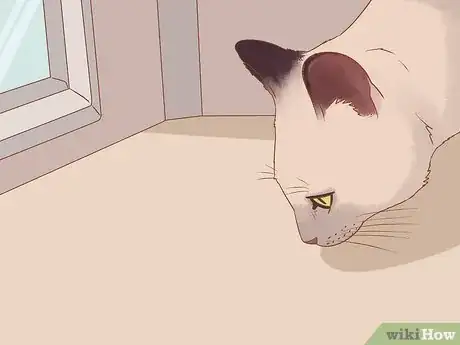
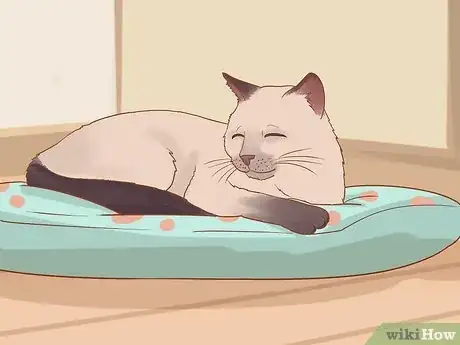
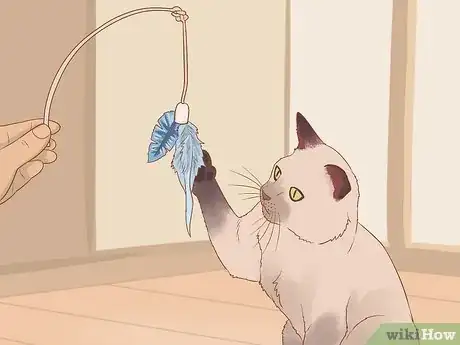
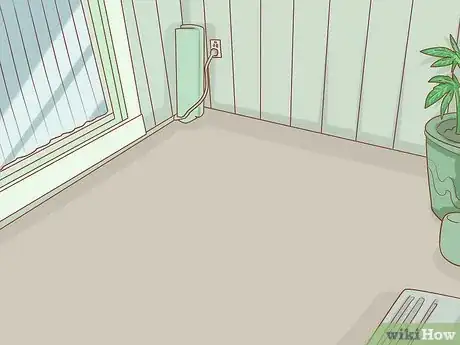


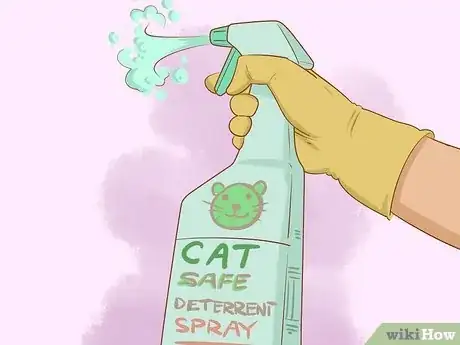



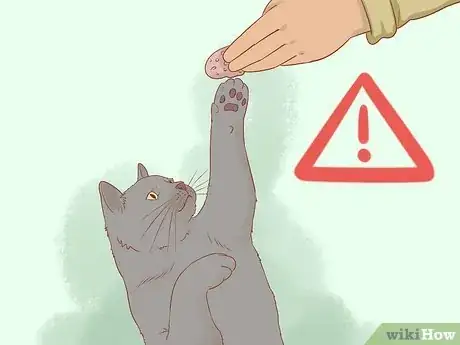




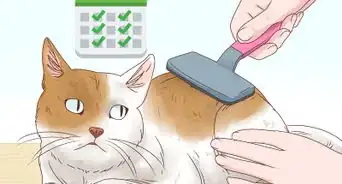

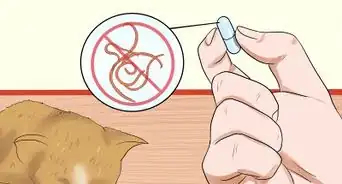

-Step-11-Version-6.webp)


